Why did spots appear on the leaves of grapes and what to do?
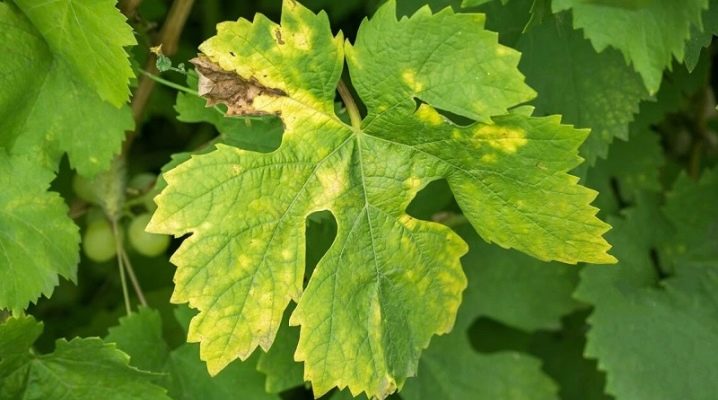
Grapes are one of the most common crops grown on most sites. As a rule, this plant pleases gardeners with an excellent harvest. But sometimes the appearance of colored spots on the foliage leads to a decrease in the yield of bushes or even to their death. To protect your vineyard, the gardener needs to learn to spot sick plants in time and heal them.
The appearance of yellow spots
The appearance of large yellow spots on the grape foliage indicates a mildew infection of the plant. This disease is also known among gardeners as downy mildew. It spreads very quickly. If you do not start treatment in time, the disease will affect not only the vineyard, but also other plantings. The foliage of diseased plants begins to die off and fall off. If the grapes already have berries at this time, they will darken and wrinkle. To combat this disease, plants are treated with drugs such as "Arcerid" or "Kurzat".
Spring treatment of the site with Bordeaux liquid will help prevent infection of grape bushes.
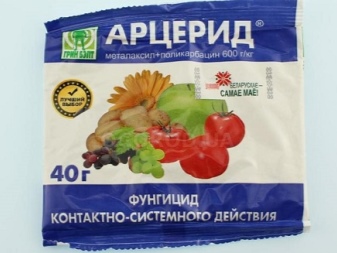

Brown and brown spots
Unpleasant dark brown spots can appear both below the foliage and around the edges. Most often, their presence indicates an infection of the plant with anthracnose. If the vineyard is affected by this fungal disease, over time, dark spots will begin to appear not only on the foliage, but also on the stems. This disease spreads most rapidly in the rainy summer. Its spread is promoted by high air humidity. To combat this disease, it is recommended to spray the bushes with Bordeaux liquid. After two weeks, the treatment must be repeated.
There are other reasons for the appearance of brown spots on the surface of foliage.
- Bad weather conditions. Very often, the condition of the plant is negatively affected by sudden changes in temperature. To prevent this from happening, seedlings for planting on your site should be chosen, taking into account the climatic features of the region.
- Wrong landing site. Lack of sunlight can contribute to the appearance of dark spots on foliage. For a plant to develop normally, it must be under the sun most of the time.
- Lack of nutrients. In order for the grapes to develop normally, they need to be fed regularly. If dark brown spots appear on the surface of the leaves, which eventually turn into holes, then the plant does not have enough potassium. With a lack of calcium, the leaf plate brightens at first. Only then do dark spots appear on it. If the foliage turns yellow and large brown spots appear on it, then the grapes need iron.
If you feed the vineyard in time, dark spots will not actively spread. In order for the plant to have enough nutrients, it is best to cut the leaves affected by the disease.
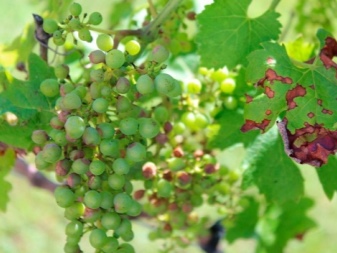
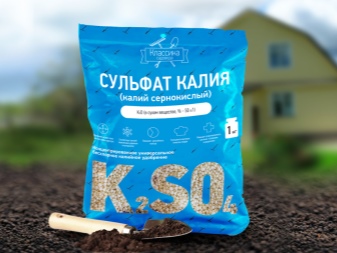
White spots
The appearance of light spots on the foliage is the first sign of infection of grapes with powdery mildew.... The spots can be not only white, but also ashy or even grayish. The foliage on which such spots appear quickly dries out and crumbles. Over time, the fruits, like the leaves, also become covered with a light bloom. This leads to the loss of the crop. As a rule, this disease develops in thickened vineyards, which are very rarely pruned. To protect your plants from this disease, excess shoots must be cut off in time.
If white spots still appear on the foliage, they must be treated with a solution of colloidal sulfur. To do this, 90 grams of the product are diluted in 10 liters of water. It is recommended to spray the bushes in the early morning or evening. It is worth doing this several times per season.
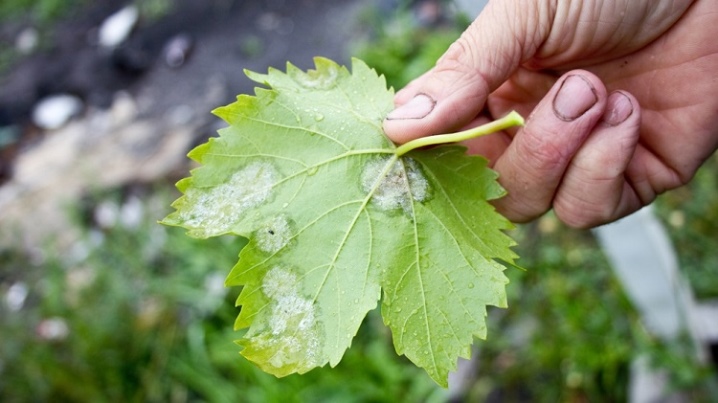
Other stains appear
Spots of other colors may well appear on the surface of the foliage. They also need to be dealt with in all available ways.
Black
The appearance of large black spots on the foliage indicates an infection of the bush. alternaria... The foliage of the diseased plant eventually becomes covered with a dense layer of fungal plaque. Over time, it spreads to the vine. If the plant bears fruit at this time, the berries will also be affected. The active spread of the disease is usually promoted by high temperatures and high humidity.
To combat this disease, it is recommended to spray the bushes with Bordeaux liquid... All infected branches should be removed. If dark spots appear on the foliage, this may also indicate that the grapes have been affected by black spot. This disease is called escoriasis. Not only foliage suffers from it, but also shoots. Black spots also appear on them. If the plant is too badly affected, its shoots begin to break over time, and the fruits fall off.
Since this disease most often affects thickened plantings, excess shoots of grapes are recommended to be cut regularly. It is also important to remove all fallen leaves from the site in a timely manner. If the disease nevertheless struck the bushes, they must be treated immediately. The first step is to remove all affected shoots. After that, the vineyard must be treated with Bordeaux liquid. After a few days, this procedure will need to be repeated. In order not to lose your harvest, plants should be regularly inspected in the summer. Particular attention should be paid to the vineyard in August.
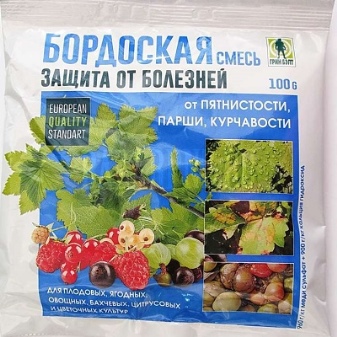
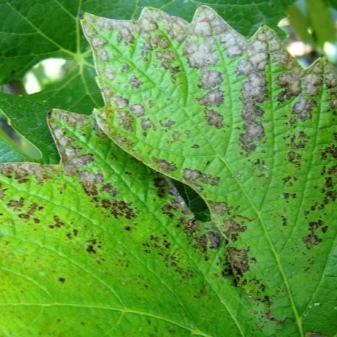
Red
Large red spots that appear on foliage indicate an infection of the site rubella... This disease usually affects plants that are deficient in potassium. In addition, signs of the disease may appear after prolonged drought. To protect plants, potash fertilizers should be regularly applied to the soil. In addition, the bushes should be well watered in case of drought.
Another reason for the appearance of red spots on foliage is spider or felt mite activity. In green grape varieties, yellow spots appear on the leaves in this case.
To protect plants from pests in spring and autumn, the site should be treated with fungicides. In the process of preparing the site for winter, you need to remove all plant residues from there.
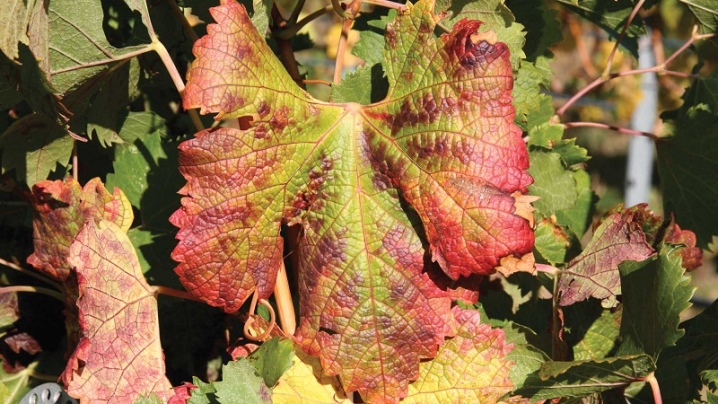
Rusty
The appearance of rusty spots on the foliage indicates an infection of the plant. rust... They grow in size very quickly. Infected leaves dry quickly and fall off the bushes. The disease spreads rapidly, infecting not only the vineyard, but other green spaces as well. Therefore, you need to start the fight immediately. Noticing the affected foliage, the grapes need to be treated with fungicides. After 2-3 weeks, this procedure must be repeated.
Having learned how to fight the most common diseases, the gardener can count on a good harvest.
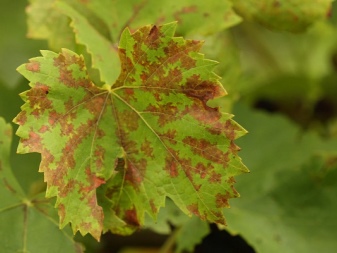
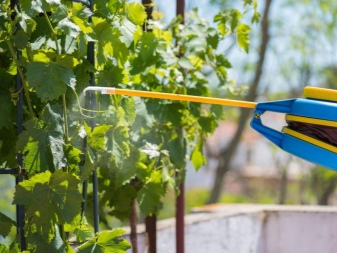













The comment was sent successfully.